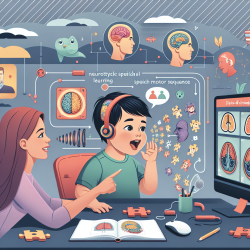Introduction
As practitioners in the field of speech language pathology, understanding the multifaceted influences on children's health is crucial. The recent study titled "Associations between Screen-Based Activities, Physical Activity, and Dietary Habits in Mexican Schoolchildren" provides valuable insights into how screen time affects physical activity and dietary habits among children. By integrating these findings into practice, we can enhance our strategies for promoting healthier lifestyles among children.
Key Findings from the Study
The study highlights several important associations:
- Screen-based activities, such as TV watching, video game playing, and computer use, are linked with unhealthy dietary habits and reduced physical activity.
- Household income and participation in organized sports are significant correlates of screen-based activities.
- Boys tend to engage more in screen-based activities compared to girls, and these activities have a more pronounced negative impact on their dietary and physical activity behaviors.
Implications for Practitioners
Understanding these associations can help practitioners develop targeted interventions. Here are some strategies to consider:
- Promote Balanced Screen Time: Encourage parents to set limits on screen time and promote activities that involve physical movement.
- Incorporate Physical Activity: Suggest integrating short, fun physical activities into daily routines to counteract sedentary behavior.
- Educate on Healthy Eating: Provide resources and workshops for families on healthy eating habits and the impact of screen time on diet.
- Consider Socioeconomic Factors: Tailor interventions to account for the socioeconomic status of families, as access to resources can vary significantly.
Encouraging Further Research
While this study provides a solid foundation, further research is needed to explore the underlying mechanisms linking screen-based activities with health behaviors. Practitioners are encouraged to stay informed about ongoing research and consider participating in studies that investigate these associations further.
Conclusion
By applying the insights from this study, practitioners can play a pivotal role in mitigating the negative impacts of screen time on children's health. Tailoring interventions to address screen time, physical activity, and dietary habits can lead to better health outcomes for children.
To read the original research paper, please follow this link: Associations between Screen-Based Activities, Physical Activity, and Dietary Habits in Mexican Schoolchildren.










